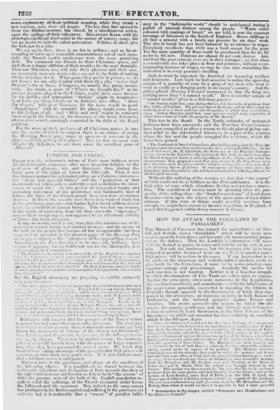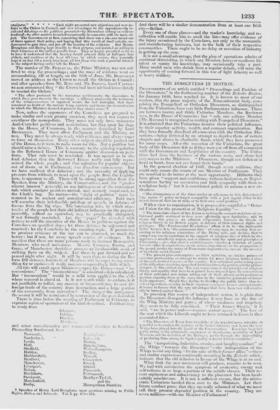110W TO ATTACK TIIE CORN-LAWS IN PARLIAMENT.
3Iarquis of CHANDos has warned the agriculturists of Nor- fiille and Stitfolk, that a " formidable" attack will be made next session upon the Corn-laws; and has earnestly recomn tended prepa-
rations thr defence. That his Lordshie's exhortation will meet ith the desired response, in union and activity on his side, is cer- tain. Not only the landowners, but the tenantry who have been
induced to promise increased rents on the fitith of another year's high prices, will be zealous in the cause. It' any impression is to he made on the numerous and well-disciplined phalanx ready to give battle for the Corn-laws, it must be by corresponding—nay superior—energy and perseverance. Assuredly the motive for such exertion is not wanting. Neither is it a hopeless struggle
in which the champions of Free Trade are called upon to engage. Against the same party, when more numerous in the Legislature, the combined merchants and manufacturers, with the inhabitants of the great towns generally, succeeded in repealing the Orders in Council ; though opposed by the Government of 1812, then sup- ported by the aristocracy, an immense majority in both Houses of Parliament, and the national prejudice against France and America. The modits operandi—the system by which 66- oli- garchy, the country gentlemen, and the Ministry were clofeitted- is thus described by Lord IlitouoitAst, in the First Volume of his Speeches ; ' to which our attention has been called by an excellent article in the Glasgow Argus.
When the Orders in C'ounc'il and the American Embargo tic 1 ehreateued
Brit cm.oneree with destruction, the merchants and manufnetaers of Lon- don, Bull, Manchester, and Urea pool, comprising all the industry of York- toad Imes-Lire, and all the general trade which centre= in tix capital, ktitione.tl Parliament against the obnoxious policy of ;be Orders, trowel to he heard ty their counsel, and tenthred ccidowe (pr tic Works s,stailad by them front the :peration of these Orders. Nr. Brottghnla was their counsel, and heard at the bar of both [louses ; where he likewise adduced the evidence during several weeks in support of she petition. The Ministry, however, triumphed over all the attempts then made to defeat the system ; and it was not outll team years after, in 1612, that the general distress Laving gone on in- crerslog, there was found any chance of obtaiuing a more favourable hearing. Both Mr. Brougham and Mr. Stephen were now Members of the house of Conn: ons ; and in March 1812, the subject was brought forward by the former. This motion was then negatived; but Scull after Easter he presented petitions front the same parties who had formerly been his clients ; and nu the motion of Lord Stanley, (now Earl of Derby,) on the 28th of. April, the !louse agreed without a division to hear evidence in support of the petitions. 770' ease was craufucted scent night f»• seren trucks by Mr. 'Brougham and Mr. Baring, than whom it would not have Umm possible to find a robre powetful
* Introduction to the chapter entitled "Commerce and Manufactures and the.Orders in Council."
coadjutor." • • * • " Each night presented new objections and new de- feats to the Orders in Council, and new advantages to the opposition—by on- eidental deb:dings on the petitions presented—by discussions arming on evidence tendered—by other matters broached occasionally in connexion with the inain ob- ject. The Government at first, conceiving that there was a clamour raised out of doors against their policy, and Loping that this would of itself subside, en- deavoured to gain time, mid put off the hearing of the evidence. But Messrs. Brougham and Baring kept steadily to their purpose, and insisted on calling in their witnesses at the earliest possible hour. '1:hey at length prevailed so far as to have it understood that the hearing, should proceed daily at half-past four o'clock, and continue at the least till ten; 1w which means, they generally kept it on foot till a much later hour, all but those who took a peculiar interest in the subject having earlier left the House."
The murder of Mr. PERCEVAL, the Prime Minister, was not suf- fered to stop the proceedings ; and the mass of evidence went on accumulating, till at length, on the 16th of June, Mr. Bitoranast moved an address to the Crown to recall the Orders in Council : and after speeches from Mr. Ross: and Mr. -BARING, Lord CASTLE.. REACH announced that " the Crown had been 'advised immediately to rescind the Orders."
" The effect produced by the numerous petitions—by the discussions to which these gave rise—by the meetings a different places—by the testimony of the witnesses—were so apparent within the last fortnight, that there remained no doubt of the motion being carried; and hence the determination to which the Ministers deemed it prudent they should come.''t
Now, unless the opponents of the Corn-laws are prepared to make similar and even greater exertion, they need not expect to overthrow the monopolists. They must nut only have numerous Anti-Corn-law petitions and associations, but they must lay siege to the House of Commons, in the manner described by Lord Raounitaai. They must allow Parliament and the Ministry no rest. They must be always ready with evidence, and always eager to force on discussion. Every other subject should be pushed out of the House, as it were, to 'nuke room tia this. Not a petition but should raise a debate. This is contrary to the existing regulation in the Reformed House of Commons against discussion on peti- tions. That rule must he rescinded. It was agreed to in the fond delusion that the Reformed House really and bully repre- sented the whole people ; and that agitation for. popular objects out of doors, or in Pailiament, was therefore unnecessary. But we have outlived that delusion ; and the necessity of applying pressure from without, to react upon the people front the Legisla- ture, is apparent to all. There will be strong opposition from the Speaker, from the Ministry, the Conservatives, and the " predt, minant interest " generally, to any infringement of the convenient rule which consigns petitions unread, and scarcely mentioned, to the Clerk's bag. No matter—the right of petition" must be restored to its ancient and constitutional efficiency. Bold men will exercise their indefeasible privilege of speech, in defiance of frowns from the big \riga. The innovating rule, by which nine- tenths of the people lost their old indirect influence on the popular assembli, without an &pirated, may les practically abrogated, if not formally rescinded. Let the paper" be crowded with notices to call the attention of the Hou:e to petitions against the Corn-laws on specified days; let those debates be adjourned and renewed ; let the Corn-laws be the standing topic. If permission to produce evidence at the bar can be obtained, so much the better ; but if not, let every speech consist of evidence. It is manitbst that there are many persons ready to instruct Honourable Members who need assistance. Messrs. Counes, SNUTII, and GREO, of Manchester, doubtless possess an inexhaustible stock of striking facts on the suhjeet. Let these be put forward and re- peated night after night. it will be seen that, as during the Re- form Bill debates, hundreds of ,Ilembers will be eager to say some- thing for or against—it really maters comparatively little which.
All this will entail upon Ministure—upoa the House—vast in- convenience." The "inconvenience" is admitted—it is calculated. But " inconvenient" would be a mild term applied to the evils whose removal is aimed at. Is it not worth while to endure, is it not justifiable to inflict, any amount of inconvenience, to save the foreign trade of the country from destruction, and a large portion of the community front starvation ? The sharper the annoyance, the sooner it will be terminated by concession of the post defended.
There is time before the meeting of Parliament in February-, to organize a plan of operations of the kind de scribed. Petitions may. be ready from
Glasgow, Paisley.
e.
and other manufacturing at el ((alma-, ciel districts in Seot.Ind. • Proceeding Southward, free!
Newcastle. Noelee..ete, Sunderlarel, laka...•;er,
Boston, oston,
Hull, Birmimsham, Sheffield, Wolverhampton,
Halifax, Dudley, Huddersfield, Walsall,
Bradford, Cloucester,
Manchester, Stroud, Liverpool, Bristol. Bolton, Plymouth. Blackburn, Portsmouth, Stockport, 3Ierthyr-Tydvil, Macclesfield, and the Derby, Metropolitan Districts.
t Speeches of Henry Lord Brougham, upon questions relating to Public Bights, Duties, and Interests. N'ol. 1. pp. 41Yt)-413.
And there will be a similar demonstration from at least one Irish city—Belfast.
Every one of these places—and the reader's knowledge and re- collection will enable him to swell the list—may offer evidence of the injury occasioned by the Corn-laws, not only to the mercantile and manufacturing interests, but to the bulk of their respective communities. There ought to be no delay or cessation of industry in getting up the case.
It is not a small advantage, that the plan of operations admits of' continual skirmishing, in which any Member, however mediocre his talent or scanty his knowledge, may occasionally take a part. Many useful men, who shrink from a regular debate, will seize the opportunity of coming forward in this war of light infantry as well as heavy artillery.



























 Previous page
Previous page